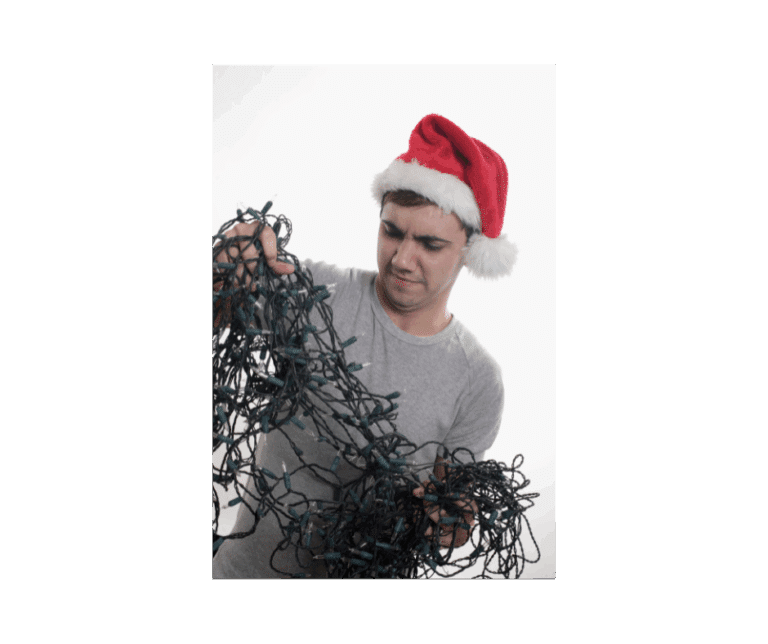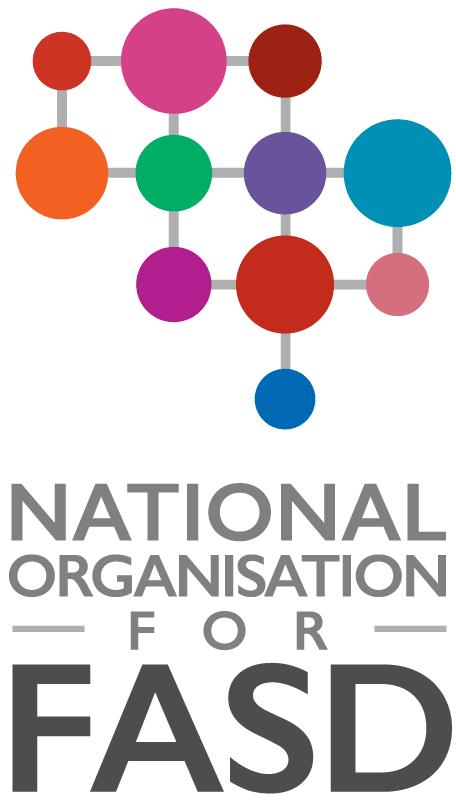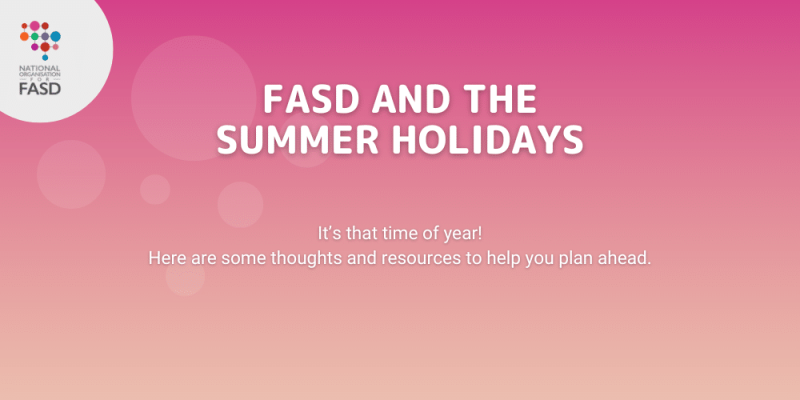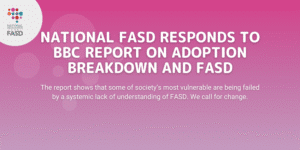There. We said it.
How did it make you feel? “FASD and the summer holidays.”
When groups of parents and carers get together in June & July conversations naturally drift on to the six weeks summer holidays.
Often what parents & carers of children and young people with FASD and Special Educational Needs & Disabilities (SEND) are thinking isn’t quite the same as what the parents of more neurotypical children are saying.
Dreading the summer holidays isn’t an unusual emotion in FASD chatrooms or in support groups, but things can be easier on everyone with a little thought and planning. (That said, there are some who find these months easier once the pressures of educational settings is gone. If that’s you, we hope you enjoy the well-earned break!)
It gets complicated. We know that some of us cannot take six weeks off work, so we have to mix and match with different work schedules, childcare or Gran & Grandad. Whatever.

So, lets lay down some basic ideas about you
- Your family is unique; there isn’t another one like it. All children and young people who have or may have FASD are different, that’s what prenatal alcohol exposure does.
There are no right or wrong answers for your child and your family. You know your child best and what you chose to do or not to do will be in their best interests.
We know that some of what we write just won’t work for some children, but they will work for some families. If it appeals give it a go.
- When you have a child with FASD you have to parent differently, for longer. Prof Raja Mukherjee’s research shows children with FASD are exceptionally different to children with other conditions. So why shouldn’t parenting be different to match this? Different parenting should be expected in the summer as well. We expect that you are used to it.

3. Don’t judge yourself by what others are doing or tell you that they are doing or posting on social media.
Their family isn’t your family and who posts what goes wrong on social media anyway?
4. Good enough parenting is well … good enough. No one can be a perfect parent 24:7 through all of the summer or ever.
So don’t be hard on yourself by creating false expectations of what might happen.
For this summer what are you key four or five things you want to achieve? Are they realistic?
Write them down as a checklist. Go back from time to time through the summer, are you on course? have you achieved one or more?
5. Take your time – well actually work at your child’s pace, take your cue from your youngster. If you have to rush things it probably won’t work and will probably make things worse and / or take even longer to do anything. This means a lot of what you do in the summer will be repeating things and patiently waiting for the brain affected by FASD to process so that you can get what you want to happen or an approximation of it.

6. You don’t have to fill every minute of every day. That can lead to burnout and madness.
If you have a child that needs regular routines, then there is always a temptation to build a detailed routine.
Remember your loved one needs downtime to regroup and rest. Having or maybe having FASD means that the brain works harder. It needs space and time to process and recover from all the work that it has to do with all of the new summer experiences.
So, you can build in the place and time to relax and recover. Yes, that might mean pyjama days. It can mean waiting hours before you eventually get to an activity in the afternoon or only doing one thing each day. Even on the holiday you have paid a fortune for.So, as a parent or carer take a book or magazine, write a book, cross stitch, knit or Lego.But remember, you may still need to show your loved one what the ‘plan’ is via a visual schedule, even if the plan is to chill.

That brings us to –
7. Make time for yourself, that’s the book, the Lego or whatever floats your boat and don’t make do with only doing it when you have managed to get to the loo and have managed to have locked the door.
How? Well, we aren’t sure because we aren’t you, but by taking care of yourself you can better care for everyone else and have a memorable summer break.
When your child takes their down time or even screen time, use that time .. call a friend, go outside in the sun (hopefully) or flick through that magazine you have been meaning to look at. Whatever.
8. Remember you aren’t alone; there are hundreds of other FASD parents and carers in the same situation. Reach out to your local support group or the FASD UK Alliance and the FASD UK Facebook group (co-administered by the FASD UK Alliance groups, including National FASD).

Okay, that’s about you, "but what about my child?" we hear you say

Well, you know them best. It’s always a bit of a balancing act between making sure that they are safe and allowing them the age-appropriate experiences that they can manage as a child, young person or an adult. Of course there is no one else who can do this balancing for your child in real time.
Do they need routines?
What are the key ones?
Maybe keep the same times to get up and go to bed, the same mealtimes maybe even play schools.
Yes, we’ve said that too!
But if it helps, try it, not all day, not every day, but just do something that touches base with the classroom.
Do they need to remember their friends?
Seeing familiar faces outside school will not only help your child stay connected so that relationships are still there in the new school year but also bridge the gap between school and the long summer holidays.
So arrange play dates, go to summer play or coaching schemes or go down the local park.
Do they need extra help to understand what is going to happen?
The FASD brain processes more slowly so start talking early and again and again, use any visual prompt to help with the drip feed and …… you get it
Do they need visual cues to understand?
Sometimes talking isn’t enough. We have a summer calendar that might help your young person visualise. You can find it here along with a lot of other useful resources to help during the summer.
Different attractions you might visit may also have videos that shows what you will see there or what to expect when visiting. They will certainly have photos on their website that you can use to show your young person.
We also have the now and next board that you can use or a daily plan
Do they need a purpose to understand what they are doing?
Some people do. You can always have a bit of down time or slow things down by making a record of the summer, a scrap book or video diary, whatever helps. It gives the summer structure and can communicate that this wont last for ever. The summer will come to an end when you finish the scrapbook.
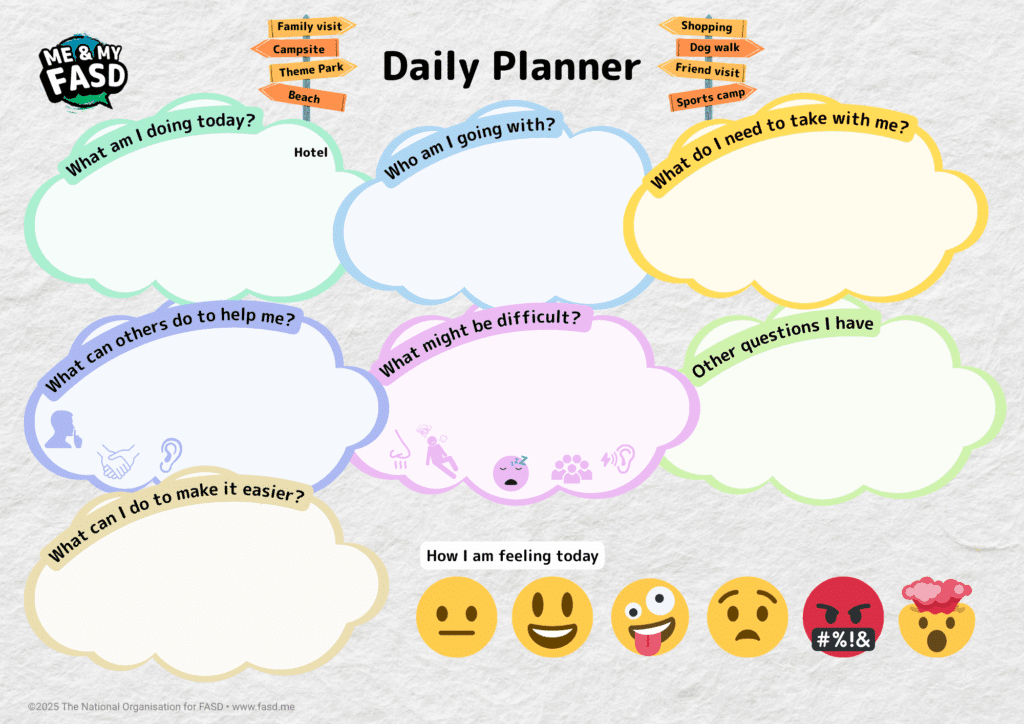
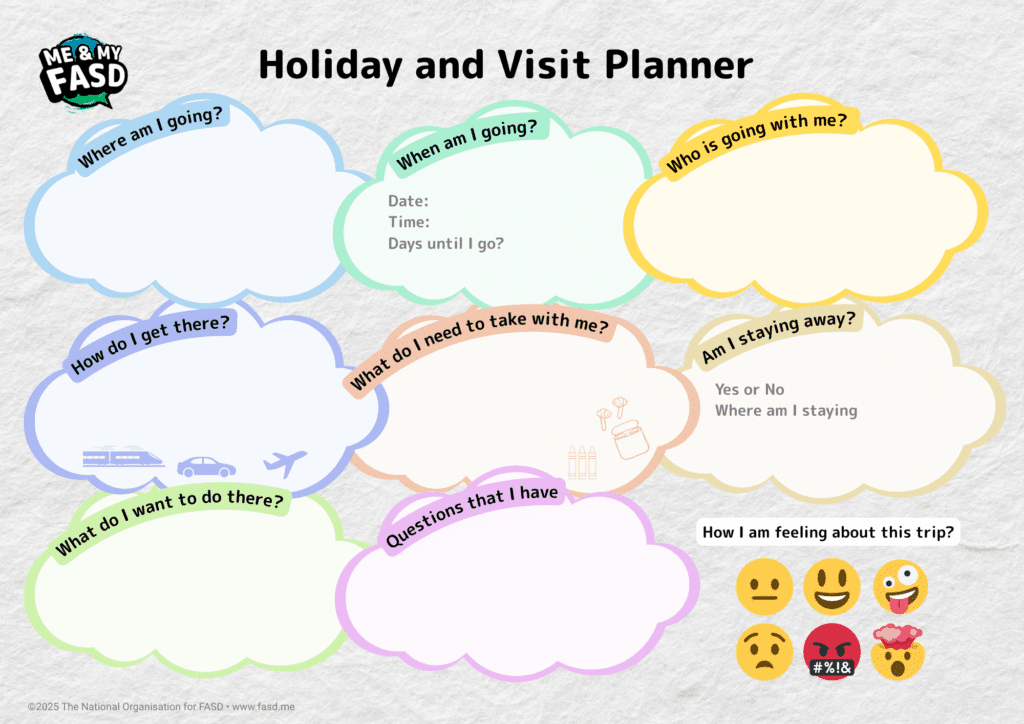
Yes, that’s all well and good, but what can you actually do?

These are just some suggestions …. They wont work for everyone. They won’t work every time but have a look and see what might work for you.
First of all, look at your local council website, you might not have to do it all. Most councils have holiday schemes and activities for children and young people in their area. In England you also can check your area’s Local Offer (google it) for activities for those with Special Educational Needs and Disabilities.
Some have even joined a special scheme called Summer of SEND. This might be happening in your area. Have a look by contacting the Council or searching for Summer of SEND.
Some charities for children in your local area might have activities arranged for every day of the summer. Have a look where you live, you don’t have to go to all of them, but you might go to some.
Whether they will know about FASD is a totally different issue, but you could use out FASD Passport and UK FASD Manifesto to start the discussion with the leaders.
We can’t tell whether your loved one can cope with the groups and noise from group activities. So the events organised by charities and councils may not be for you.
Then hopefully the weather is better. Let’s take advantage of this outdoors and in the countryside. This allows for plenty of movement and burning off energy, often a really important this for children with FASD.
Outdoor scavenger hunts. Lists or pictures of things that children or young people can find in the garden or park.
Nature walks in the countryside and taking photos of what you see to talk about later to reinforce the experiences you have, or maybe just somewhere to run around safely.
Public parks and play areas are great for children and young people who like to socialise and let off steam. The same is true of skateparks, pump tracks, outdoor gyms or basketball courts.
Whatever your young person likes or is good at. Play to their strengths
Do they like animals and wildlife? If so, then a day out at a zoo might be the answer. These can be costly so like any visitor attraction see if they have discounts for carers. However, it may not have to cost anything. Think about going bird watching or bug hunting or sit in a public place and try to name the dogs that you see people with. We bet you can’t name them all!
Take a safe dip in the water. Just like exploring the countryside, water can be relaxing. This could be a swimming pool or outdoor lido, a paddling pool or waterpark. It could be a day trip to the beach or lake. Just enjoy the day by the water, paddle, build castles, get safely wet.
If you can enjoy a free meal with a ‘kids eat free offer’. Many restaurants, cafes and even supermarkets often offer free or cheaper meals for kids (usually when an adult eats as well, check out ideas here). So, take advantage if you can. After all, if you have been enjoying the summer why would you want to cook?
Earlier we said that you will need to parent differently because our kids with FASD are different. You might want to consider using a sunflower lanyard to indicate that you are doing things differently or might need a little more understanding and even help. At the National Organisation for FASD we have one here. You can get a variation of styles at the sunflower lanyard scheme and even supermarkets often have them at customer services.
Yes, we know the kids won’t want to wear it, but maybe you could, or you could just hang it on your bag or pushchair where it will be noticed.
So, it might not be good weather, you might not be an outdoor family. If this is the case then take advantage of what your child likes or whatever they are good at. It might seem that you are just doing what you always do, but if that keeps the family happy then what is wrong with that?
It might be that you create a summer emergency kit of the things that your youngster likes best. Have this in hand just in case you need something calming to go to.
Get creative with arts & crafts – use recycled materials or things you can find around the house, drawing, colouring what ever they are good at. They can use this in the scrap book of the summer you might what to create.
Sensory Activities – these give your child the opportunity to explore textures tastes and smells. Many with FASD find these calming and relaxing. We have many examples here or on our YouTube pages. Our calming cards might help as well.
Music & Dance – This might not be your cup of tea, but for many with FASD it really is. We have some awesome people with FASD who are talented in music and dance. Explore what your young person likes to do and find opportunities to do that.
Boardgames and building blocks – These help people with FASD plan and helps with their motor skills. You could even learn about FASD with our very own boardgame The Misunderstoods.
Cooking and baking – Some people with FASD are talented in cooking and love the idea of mixing ingredients and hopefully having something to eat at the end. Cooking can aid planning, following instructions and even maybe waiting.
Drama and make up – Again something that some people with FASD love. Is it for your young person? If it is, then encourage it. It might mean that you have to watch the same play a number of times as it is rehearsed, but it could be a way of passing the summer.
Summer 2025 Challenges (Coming soon!) – We have a set of challenges that you might want to attempt. You might want to try all of them, or just one or two. You might what to blame us for the silly ideas that don’t quite work out as well.
What ever you do over the summer we would love to hear from you and what worked for you. You can contact us with words and pictures at [email protected]
The summer will come to an end
It really will and things will change again. Very often we know children and young people with FASD struggle with change and the hard work that you have done to accommodate the change to summer activities will have to be undone to get into the routine of school and the autumn. So, make sure that you talk about the end of summer coming, the end of the scrapbook and going back to school or college. Some SEND websites suggest going as far as wearing school uniform. We’d probably only suggest trying on the uniform to see if it fits, but what works for you works for you. Maybe not on the first day of the holidays though.
Tried it all and still had a bad day? Don’t worry, we all have them including our young ones with FASD. Remember you are good enough. Take a deep breath and count to 10 and then count to 10 again.
Tomorrow is another day.
Most of all the very best of luck and enjoy the summer.
Roll on Christmas!
